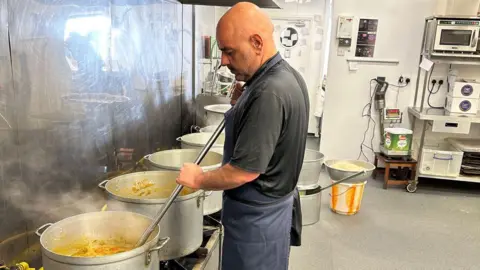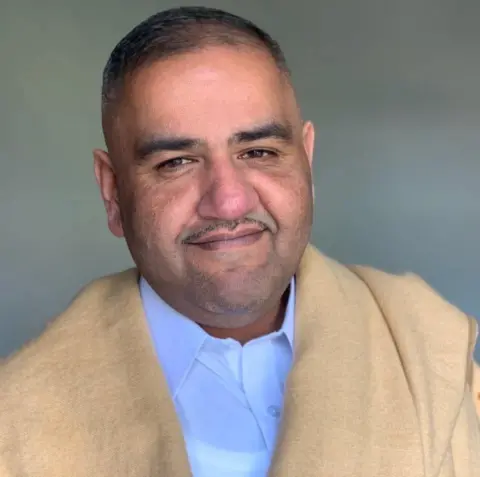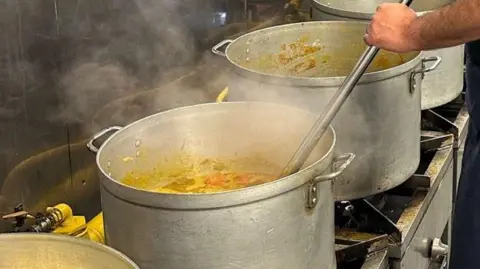'Being a chef during Ramadan is not easy'
 Mohammed Shafiq
Mohammed Shafiq"Yes, we're human, you miss the salt the sweet and other things."
Muslims fast during Ramadan to showcase self-control and empathy for those less fortunate. No food or drink should be consumed during daylight hours.
But for Mohammed Shafiq, from Derby, working as a chef during the holy month tests that devotion to an even greater degree.
"It can get hard, but you just have to keep on going and put that to the back of your mind," he told the BBC.
The 48-year-old has worked at Qurban and Son - a family business providing catering services - for about five years.
He has been cooking thousands of meals during Ramadan - many of which will be the first bit of food people have when they break their fast.
On a normal day they would prepare anything from 150 to 300 meals, he said, but during Ramadan it was "a lot more".
Mr Shafiq said he started preparing the starters at 09:30 GMT, before moving on to the main courses.
Due to the amount of people who come to collect food, he said the premises was full of people by 15:00 - some ordering up to 30 packs of food to dish out to their neighbours.
 Mohammed Shafiq
Mohammed ShafiqAll good chefs taste their food, and Mr Mohammed admits the temptation is at the back of his mind.
"Yes, we're human, you miss the salt the sweet and other things," he said.
"But your devotion to your lord becomes that little bit greater because you're always cautious - you have to be careful.
"It can get hard, but you just have to keep on going and not think about it."
He said despite participating Muslims refraining from eating or drinking during daylight hours, the catering industry was busier than ever.
This is down to the Iftar - a daily meal during Ramadan when the fast comes to an end.
Traditionally, families and friends gather at sunset to break their fast together, strengthening bonds through shared meals - something which Mr Shafiq and his staff take part in.
 Mohammed Shafiq
Mohammed Shafiq"Once we've given everybody their food, once it goes quiet in the shop, that's when we will break our fast together with all the workers," he said.
"It's good but at that time you can't eat a lot because you want to break your fast, have a drink and then serve the next customer because they don't stop coming in.
"You have a little bite to eat and then you're back at it and you eat a bit later on after you've prayed.
"It's a means to assess the sincerity you have to your lord - so it's not just about abstaining from food, it makes your connection to your creator that little bit better."
Ramadan is expected to come to an end on Sunday.
Follow BBC Derby on Facebook, on X, or on Instagram. Send your story ideas to [email protected] or via WhatsApp on 0808 100 2210.
